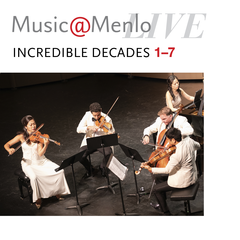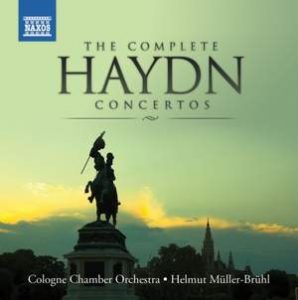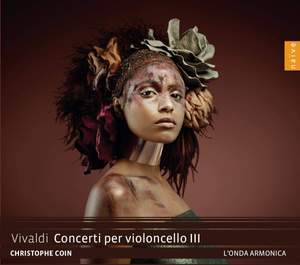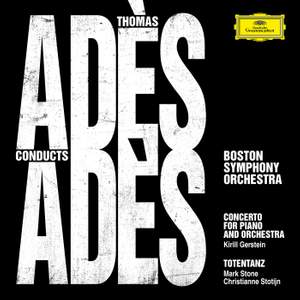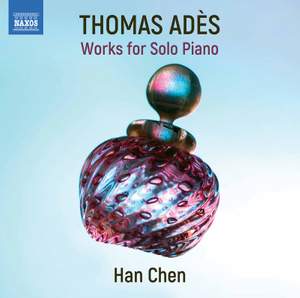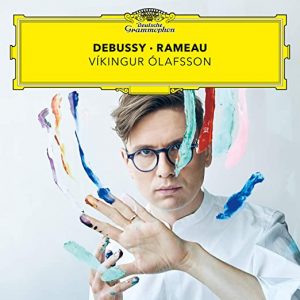Music@Menlo Live, 2019 (available at https://musicatmenlo.org/live/)
Year in, year out the Music@Menlo music education program issues its Music@Menlo Live series of recordings with music performed by the program's instructors. The cast has changed since the series began in 2002, though a few of the originals are still in evidence: program directors pianist Wu Han and cellist David Finckel, violinist Arnaud Sussman, and violist Paul Neubauer. Even with just this small core of originals, the high quality of the performance has not changed. Nor has the very high quality of the audio, thanks to renowned recording engineer, Da Hong Seetoo, whose praises I get to sing every time I come to these albums.
Each year, for some reason, there is a theme to the proceedings, this year, "Incredible decades:" 1712-1720; 1791-1795; first decade of the nineteenth century; mid-nineteenth century; late nineteenth century; early 1920s; and (surprise!) the 1990s. The last CD is unusual for the series, which has tended to venture no further than the early twentieth century—perhaps a product of the program's educational focus.
If you approach this as a series of free live concerts rather than an album, as I have come to do, you will more than likely be delighted, as I was. Part of this may have to do this year with the greater of number of new, presumably young, musicians. As I say, a few of the veterans are here, but none in leading roles. A few of the performances are show-stoppers, especially a movement from Handel's Water Music. Much in the spirit of McGegan and his San Francisco based Philharmonia Baroque Orchestra of nearly a generation ago, it is fast-paced and elegant—as good as any I've heard.
The Complete Haydn Concertos, Cologne Chamber Orchestra, Helmut Müller-Brühl. Naxos 8.506019
Against all odds and to my delight, everything in this 6 CD bargain set from Naxos is terrific—and you get one of the world's very best young violinists playing the composer's three violin concertos, Agustin Hadlich. Google this young musician and check out a discography to make your year. Everything he takes his bow to—Adès, Brahms, Sibelius, Legiti—is wonderful. And his Haydn here is a marvel. Further, they drafted the brilliant young cellist, Maria Kliegel, to do the three cello concertos, and she plays them as well as anyone…anyone. All of this said, the key to the excellence of the set as a whole has to be Helmut Müller-Brühl and the Cologne Chamber Orchestra, who bring more brio and sophistication to the composer than I've heard for a long time. A steal of an album. Steal it!
Vivaldi Concerti per Violoncello III. Christophe Coin, cello. L'Onda Armonica. naïve OP 30574.
Naive's Vivaldi Edition marches impressively on (this is volume 61), and cellist Christophe Coin hasn't lost a step. At age 62, he is arguably the best early music cellist in the world. This is Volume 3 of the composer's cello concertos in the series and Coin is gorgeous. L'Onda Armonica is as well; no let down from Il Gardino Armonico, who do Volumes 1 and 2. Do you really need a description of this music? I didn't think so.
Thomas Adès, Concerto for Piano, Totentanz. Adès directs the Boston Symphony Orchestra. Deutsche Gramophone. DG 483-7998.
Thomas Adès has finally found himself a new recording label! His fruitful collaboration with EMI died with the demise of that label in 2012 (founded in 1931) but when he became Artistic Partner with the BSO, a longtime DG connection, hopes rose. And here we have their first album: two of the composer's recent works, both premiered with the BSO where several Neills heard them at Symphony Hall when these recordings were made 'live' in 2016 and 2019.
The Piano Concerto calls up some of the modernist magic of his Piano Quintet, but the added orchestral textures and fullness almost tell us what Saint-Saëns might have done had he lived and composed a century later. We are swept up in a richness of dissonance followed by a movement of poignant introspection that edges into a clamorous assertiveness that has the usual Adès doubt and disquietude. The final movement, full of attractive syncopation, flirts with modernist Gershwin and then flies into a boisterous conclusion. I am giving you description here in lieu of judgment because it's still working on me. I am a fan, so it will come. It is said he wanted to write a traditional concerto and we can hear him here adapting his unique voice to a conventional form.
Tatentanz for two voices and orchestra was extraordinarily moving live in Symphony Hall where a translation of the German text was flashed above the stage to guide us gracefully through its grim tale: death compelling each of the characters to dance with him: from pope to king and on down the social ladder to a child. If you can listen to it at home without distraction, following the (essential) libretto, you can come close to that experience we had. I find Adès' vocal music a mixed pleasure but his opera based on Shakespeare's The Tempest and this ‘oratorio' are quite extraordinary. He is a major composer who, like the late Penderecki, must be given space to move. Two very different, very powerful modern voices.
Thomas Adès, Works for Solo Piano, Han Chen, Naxos 8.574109.
Boiling a truly major composer town to his essence seldom disappoints and this is the case for Adès. I've never been sure about his opera, Power Her Face, but listening to it in "concert paraphrase" for solo piano, I am once again reassured that he is who he is. This entire album sits us down with the composer where most composers start their creative work—at the keyboard—and lets us hear the birth of Adès' music. Young Taiwanese American pianist Hen Chen is a perfect musician for the occasion. One needs a wide open mind and fast hands to play Adès piano music and that describes Han Chen perfectly. A graduate of Julliard, we are told he is currently studying with brilliant modern music performer Ursula Oppens, so he's in the right place.
Seven solo works comprise his outing here and all move us in different ways. Darkness gets startling new clothing in "Still Sorrowing" and "Darkness Visible," so that we barely recognize it, until we do. Simplicities bloom into complexities, then resolve themselves back. In the three-part work, Traced Overhead, Adès leads us into a poignant dissonant thicket, which we find we are loath to leave. In Three Mazurkas for Piano, we learn what Chopin might have composed had he lived two centuries later—with a modernist disposition and a more crooked and deliberate mind.
The plaintive, elegiac Souvenir concluding the program comes as both relief and and shock after the high energy dramatics of the works that precede it. This quiet voice appears occasionally in Adès' oeuvre and always comes as an unexpected and welcome blessing. In this album it serves as a benediction.
If you miss this CD, you will (re) discover it years from now and wonder how you could have done so.
Debussy • Rameau. Víkingur Ólafsson, piano. Deutsche Grammophone 4837301
What makes this irresistible album most interesting to me is young Icelandic pianist Ólafsson's decision not to play Rameau on the piano as if it were the harpsichord it was composed for, not to punish the piano for not being a harpsichord, but to unloose the power of the modern concert grand to let us hear the powerful eloquence this baroque composer is capable of. The intriguing thing some modern musicians do to older music is not to try to restore or preserve it as ‘early music' folk do, but to renew it, to make it new. This doesn't always work. It did not work well at all in the 1960's with Bach, Beethoven and Brahms. But when it does work, it can be a revelation as it is here.
What it does in these performances of Rameau alongside several of Debussy is to let us hear the connections between them. It is not historically correct but it is aesthetically magic. Art is not limited to creators' intentions—and those put upon them by their times, both their cultures and the available instruments. Once art is created and sent out into the world it is free to let its latent as well as its obvious qualities emerge. But is Òlafsson's Rameau the real Rameau, musical purists will ask? Of course. And so are Trevor Pinnock's versions on harpsichord. Or is there no real Rameau? Let your ears and soul decide, if you trust them. I'm very fond of the baroque Rameau. But I love this 21st century Rameau. And no, Òlafsson does not baroquefy Debussy! That is not the silly kind of




